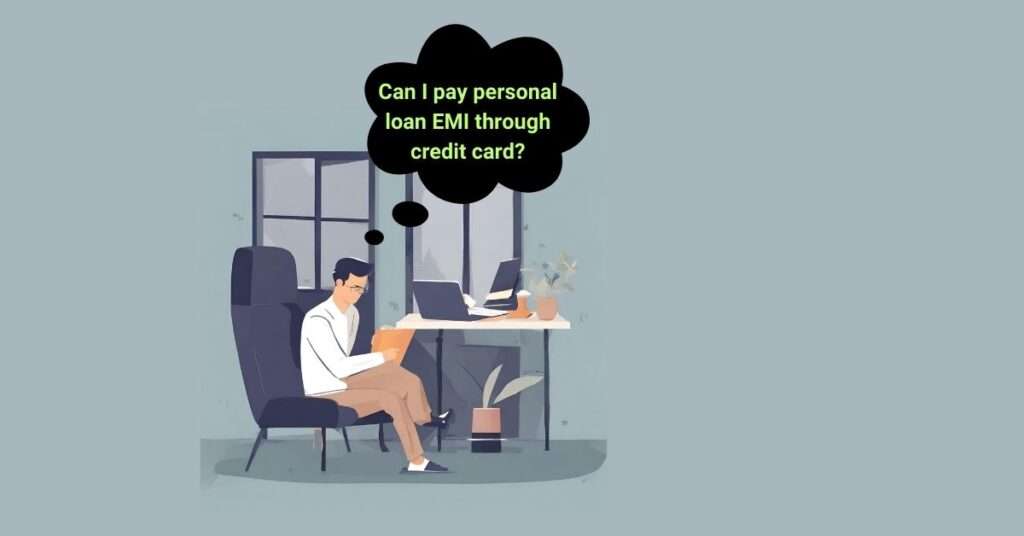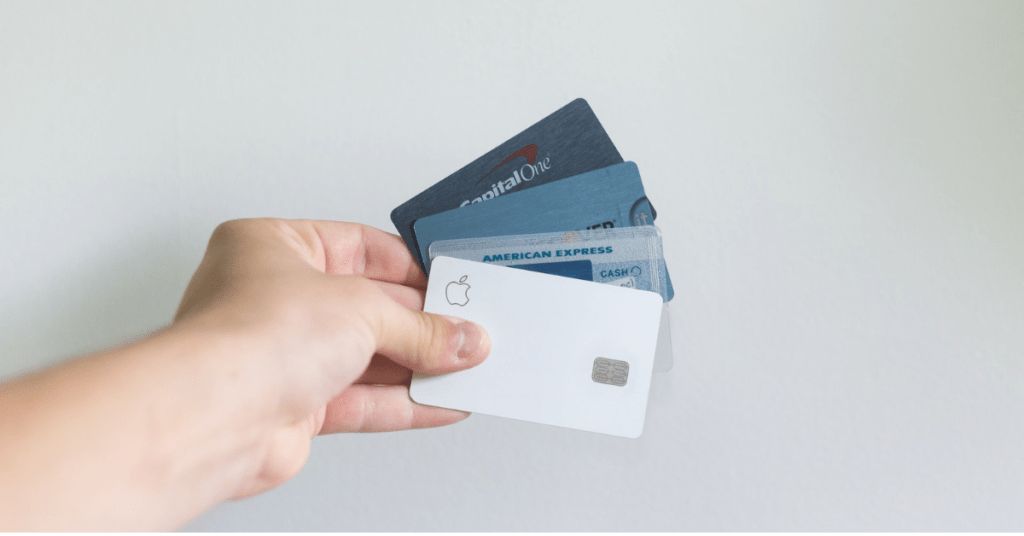Managing personal finances can be challenging, especially when you have multiple financial obligations. One common financial commitment is a personal loan. While personal loans can be a lifeline during emergencies or for planned expenses, paying the Equated Monthly Installments (EMIs) on time is essential to maintain a good credit score. In this digital age, you can make your life easier by paying your personal loan EMIs through your credit card. This article will guide you to pay personal loan EMI payment through credit card, highlighting the benefits, potential drawbacks, and addressing frequently asked questions (FAQs) to ensure a smooth and informed transition.
Table of Contents

Section 1: Understanding Personal Loans and EMIs
What is a personal loan?
A personal loan is an unsecured loan offered by financial institutions, such as banks and online lenders, to help individuals meet various financial needs. Unlike home loans or car loans, personal loans do not require collateral, making them accessible to a wider range of borrowers. These loans are typically used for purposes like debt consolidation, medical expenses, education, or home improvements.
How do personal loan EMIs work?
EMI stands for Equated Monthly Installment, which is the fixed amount you pay every month to repay your personal loan. The EMI consists of both the principal loan amount and the interest, spread over the loan’s tenure. EMI payments ensure that you repay the loan over a specified period, typically ranging from 12 months to 60 months, depending on the loan terms.
Why is timely payment of your EMIs important?
Paying your personal loan EMIs on time is crucial for several reasons:
- Maintaining a Good Credit Score: Timely EMI payments positively impact your credit score. A good credit score is essential for future financial transactions, including obtaining credit cards, mortgages, or more loans.
- Avoiding Penalties: Late or missed payments can result in penalty charges, increased interest rates, and potential legal actions by the lender.
- Building Trust: Consistent, on-time payments build trust with your lender, which may be beneficial if you need financial assistance in the future.
- Financial Discipline: Meeting your financial commitments instills discipline and responsibility in managing your finances.
Section 2: Paying Personal Loan EMI payment through Credit Card
Is it possible to pay personal loan EMI payment through credit card?
Yes, it is possible to pay your personal loan EMI payment through credit card. Many financial institutions and lenders offer this option as a convenience to borrowers. However, not all lenders may provide this service, so it’s essential to check with your specific lender.
Which banks and lenders offer this facility?
The availability of paying personal loan EMIs through a credit card can vary depending on your location and the lender’s policies. Most major banks and some online lenders offer this facility, but it’s important to check with your lender to confirm.
What are the prerequisites for making payments through credit cards?
To pay your personal loan EMI payment through credit card, you generally need to meet the following prerequisites:
- An Existing Credit Card: You must have an active credit card with an adequate credit limit to cover your EMI payments.
- Lender Approval: Your lender must allow credit card payments for EMI. Contact your lender to ensure they support this payment method.
- Biller Addition: You’ll need to add your lender as a biller in your credit card account to set up payments.
- Sufficient Credit Limit: Ensure that your credit card has enough available credit to cover the EMI amount without maxing out your card.
Section 3: Benefit
There are number of benefits of paying personal loan EMI payment through credit card
Consolidation of Payments
One of the primary advantages of using your credit card to pay personal loan EMIs is the consolidation of payments. Rather than keeping track of multiple due dates and accounts, you can centralize your financial obligations on your credit card statement, making it easier to manage your finances.
Cashback and Rewards
Many credit cards offer cashback, rewards, or loyalty points for transactions, including EMI payments. By using your credit card, you can potentially earn rewards or cashback, effectively reducing the cost of your personal loan.
Convenience and Flexibility
Paying your personal loan EMIs through a credit card provides a level of convenience and flexibility. You can set up automatic payments, ensuring you never miss a due date. Additionally, you can choose to pay the minimum amount due or the full EMI, depending on your financial situation for the month.
Potential Savings on Interest
Some credit cards offer promotional interest rates, which may be lower than the interest rate on your personal loan. By paying your EMIs with a credit card, you might save on interest costs over the loan tenure. However, it’s essential to compare the interest rates and terms to determine if this would be financially beneficial for you.

Section 4: Potential Drawbacks
Even though there are benefits of paying personal loan emi payment through credit card, there are some drawbacks also.
High-Interest Rates
Credit cards often come with higher interest rates compared to personal loans. If you don’t pay off your credit card balance in full each month, you could end up paying more in interest charges on the EMI payments than if you had stuck with the personal loan’s interest rate.
Credit Limit Considerations
Using your credit card to pay personal loan EMIs can impact your available credit limit. If your credit card limit is not significantly higher than your EMI amount, you might end up maxing out your card, which can harm your credit score and financial flexibility.
Impact on Credit Score
While paying personal loan EMI payment through credit card can positively impact your credit score if you make timely payments, missing payments or carrying a high credit card balance can have the opposite effect. It’s crucial to manage your credit card responsibly to maintain or improve your credit score.
Hidden Fees and Charges
Some credit card issuers may charge fees for using their card to pay personal loan EMIs. It’s critical that you comprehend these costs and take them into account when making decisions.
Section 5: How to Pay Personal Loan EMIs Through Credit Card
Paying your personal loan EMIs through your credit card involves a straightforward process. Here’s how you can do it:
- Contact Your Lender: Start by contacting your lender to confirm that they allow EMI payments through credit cards. They will give you the information and direction you need.
- Select a Suitable Credit Card: Choose a credit card from your existing cards that has a sufficient credit limit and favorable terms for EMI payments. You can also consider applying for a new card if none of your current cards are suitable.
- Add the Lender as a Biller: In your credit card account, add your lender as a biller. This will allow you to set up recurring payments and ensure your EMIs are paid on time.
- Set Up Automatic Payments: Configure your credit card to automatically pay your personal loan EMIs on the due date. By doing this, the possibility of missing payments and facing penalties is reduced.
Section 6: Tips for Efficiently Managing Personal Loan EMI payment Through Credit Card
To ensure you effectively manage your personal loan EMI payment through credit card, consider the following tips:
- Monitor Your Credit Card Statements: Regularly review your credit card statements to ensure that EMI payments are being processed correctly and to keep an eye on your credit card usage.
- Maintain a Good Credit Score: Focus on maintaining a healthy credit score by making on-time payments and managing your credit card responsibly.
- Be Aware of the Due Dates: Stay vigilant about your personal loan EMI due dates to avoid late payments and associated penalties.
- Seek Professional Advice When Needed: If you’re uncertain about the financial implications of using a credit card for EMI payments or how it may affect your credit score, don’t hesitate to consult a financial advisor.
Section 7: Conclusion
In conclusion, paying personal loan EMI payment through credit card can offer various advantages, including convenience, consolidation of payments, cashback, and rewards. However, it’s essential to be aware of potential drawbacks such as high-interest rates, credit limit considerations, and the impact on your credit score. By following the guidelines and tips provided in this article, you can make an informed decision and efficiently manage your personal loan EMI payment through credit card, all while maintaining financial stability and responsibility.
Section 8: FAQs About Pay Personal Loan EMI payment Through Credit Card
Can I use any credit card to pay my personal loan EMIs?
Not necessarily. Your credit card should have a sufficient credit limit to cover your EMI amount, and it’s essential to check if your lender accepts credit card payments for personal loan EMIs. Different credit cards may offer varying benefits, so choose one that aligns with your financial goals.
Will my credit card limit be affected by these payments?
Yes, using your credit card to pay personal loan EMIs will affect your available credit limit. Ensure you have enough credit available to avoid maxing out your card, which can have a negative impact on your credit score.
How does this affect my credit score?
Paying personal loan EMIs through a credit card can positively impact your credit score if you make timely payments. However, missing payments or carrying a high credit card balance can harm your credit score. Responsible credit card management is crucial.
Are there any tax implications?
Tax implications may vary depending on your country’s tax laws. In some cases, the interest paid on a personal loan is tax-deductible, while credit card interest is not. It’s advisable to consult a tax professional to understand the specific tax implications in your situation.